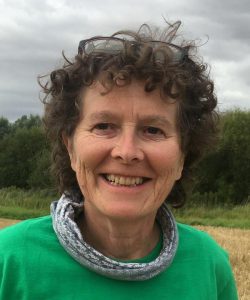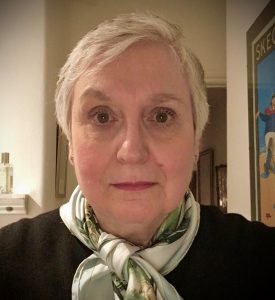Our volunteers work on a variety of projects. Read about some of their experiences below.
 Katrina Lidbetter
Katrina Lidbetter
A few years ago, I was delighted to become a volunteer at The National Archives. Upstairs in the Reading Rooms, I had discovered how the wonderful work of the organisation had made it possible for me to follow the story of my father’s experiences in the Eighth Army, as recorded in the regimental war diaries. Having done this, I wanted to learn more. I joined the Friends and told them of my interest in the Second World War.
I was very fortunate that there was an opportunity for me to volunteer on Project WO 416, cataloguing German records, mainly about Allied prisoners of war (PoWs). Although I understand German, the handwritten cards with their military terminology and abbreviations would be impossible for a novice to understand. Under the expert and patient guidance of my tutor, Kelly, I learned to decipher a variety of different German record cards and log them onto a spreadsheet.
After years of work by our team of dedicated volunteers and staff, the task is now done! I am sad that our project has now come to an end, but proud of the result: you can now search WO 416 records on Discovery and trace the many stories of those PoWs. Sometimes their date and place of capture is recorded. This speaks volumes: a Seaforth Highlander captured in 1940 at St Valery must have been one of those brave band of heroes ordered to stay behind and hold the line against the Germans so that our troops could escape at Dunkirk. A soldier captured in North Africa in 1942 must have been fighting Rommel’s Afrika Korps in the dust and heat of the desert. Some cards have photographs: defiant or tired, they become real people, gazing at me from the past.
These people can also be traced in other records at The National Archives. I am delighted that my new project, contributing to an online catalogue of series WO 208, is helping to do just that. Guided by my new expert tutor, Keith, I am recording the details of Allied troops who escaped or evaded the Germans and made it back to Switzerland (WO 208/4238-4276) or Allied lines (WO 208/5393-5450). Those who escaped from German PoW camps may appear both in WO 416 and WO 208. For example, Major A S B Arkwright, of the Royal Scots Fusiliers, together with Captains Coombe-Tennant and R J Fuller, were the only three who escaped successfully from Oflag VIB, Warburg, in a mass “great escape” that became known as the Warburg Wire Job. With the help of the secret Comet Line, they made it successfully into Spain and back to the UK. All three appear both in the WO 416 and the WO 208 series – and their medal awards can be found in the WO 373 series. I am proud to be part of the team of volunteers helping to preserve and improve access to these heroic stories for future generations.
 Elizabeth Prior
Elizabeth Prior
Volunteering has enabled me to see behind the scenes of history and enjoy the company of fellow history fans. I began just over three years ago when I joined the team cataloguing the Carlton Papers (PRO 30/55) – a fascinating mix of the military, the personal and the mundane. From there it was a back in time to the 1630s, when I joined the cataloguers of the Privy Council registers covering the period of Charles l’s personal rule (PC 2), got to grips with 17th century secretary hand and discovered that micro-management is nothing new.
Currently I am a volunteer on two projects, State Papers Domestic George I (SP 35) and George II (SP 36) covering the years not dealt with in The National Archives’ Jacobite project undertaken to commemorate the respective anniversaries of the 1715 and 1745 Risings. The content of both SP 35 and SP 36 has been a surprise. State Papers suggested to me weighty matters of policy and not, as I have found, a whole range of subject matter from anonymous information about Jacobite plots against the King and government to petitions for the grant of Letters Patent for inventions.
There have been several high spots: in SP 35 a document signed by Sir Isaac Newton and in SP 36 coming across a letter from John Cleland explaining how he came to write Fanny Hill. My only regret is not volunteering sooner.
